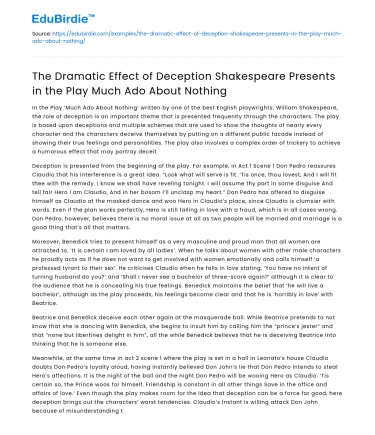In the Play ‘Much Ado About Nothing’ written by one of the best English playwrights; William Shakespeare, the role of deception is an important theme that is presented frequently through the characters. The play is based upon deceptions and multiple schemes that are used to show the thoughts of nearly every character and the characters deceive themselves by putting on a different public facade instead of showing their true feelings and personalities. The play also involves a complex order of trickery to achieve a humorous effect that may portray deceit.
Deception is presented from the beginning of the play. For example, in Act 1 Scene 1 Don Pedro reassures Claudio that his interference is a great idea. “Look what will serve is fit. ‘Tis once, thou lovest, And I will fit thee with the remedy. I know we shall have reveling tonight. I will assume thy part in some disguise And tell fair Hero I am Claudio, And in her bosom I’ll unclasp my heart.” Don Pedro has offered to disguise himself as Claudio at the masked dance and woo Hero in Claudio’s place, since Claudio is clumsier with words. Even if the plan works perfectly, Hero is still falling in love with a fraud, which is in all cases wrong. Don Pedro, however, believes there is no moral issue at all as two people will be married and marriage is a good thing that’s all that matters.
Save your time!
We can take care of your essay
- Proper editing and formatting
- Free revision, title page, and bibliography
- Flexible prices and money-back guarantee
Moreover, Benedick tries to present himself as a very masculine and proud man that all women are attracted to. ‘It is certain I am loved by all ladies’. When he talks about women with other male characters he proudly acts as if he does not want to get involved with women emotionally and calls himself ‘a professed tyrant to their sex’. He criticises Claudio when he falls in love stating, ‘You have no intent of turning husband do you?’ and ‘Shall I never see a bachelor of three-score again?’ although it is clear to the audience that he is concealing his true feelings. Benedick maintains the belief that ‘he will live a bachelor’, although as the play proceeds, his feelings become clear and that he is ‘horribly in love’ with Beatrice.
Beatrice and Benedick deceive each other again at the masquerade ball. While Beatrice pretends to not know that she is dancing with Benedick, she begins to insult him by calling him the “prince’s jester” and that “none but libertines delight in him”, all the while Benedick believes that he is deceiving Beatrice into thinking that he is someone else.
Meanwhile, at the same time in act 2 scene 1 where the play is set in a hall in Leonato’s house Claudio doubts Don Pedro’s loyalty aloud, having instantly believed Don John’s lie that Don Pedro intends to steal Hero’s affections. It is the night of the ball and the night Don Pedro will be wooing Hero as Claudio. ’Tis certain so, the Prince woos for himself. Friendship is constant in all other things Save in the office and affairs of love.’ Even though the play makes room for the idea that deception can be a force for good, here deception brings out the characters’ worst tendencies. Claudio’s instant is willing attack Don John because of misunderstanding the situation. This indicates a dangerous gullibility, and while Claudio initially seems like the victim here, innocent Hero is the one who will eventually suffer for Claudio’s surface-level thinking.
In continuation, after Claudio’s soliloquy of how he feels about Don Pedro wooing Hero for himself Don Pedro is suggesting a coordinated deception of his friends, but in this case, he intends to better those friends’ lives. “Claudio, the time shall not go dully by us. I will in the interim undertake one of Hercules’ labors, which is to bring Signor Benedick and the Lady Beatrice into a mountain of affection, th’ one with th’ other.” Don Pedro’s suggestion to matchmake Benedick and Beatrice presents an alternative to Don John’s scheming. Don Pedro’s plan complicates the situation of whether lying is always morally wrong. However, Beatrice and Benedick are truly happy when they admit they love each other and would likely never have done so without Don Pedro’s interference.
Near the end of the play a friar at Hero and Claudio’s wedding hopes the tragedy will spur others to drop their anger at her supposed disloyalty. “But if all aim but this be levelled false, The supposition of the lady’s death Will quench the wonder of her infamy.” Deception is shown completely through the characters’ world that even their religious officials spin elaborate lies. The friar’s plan is likely to work perfectly, because it gives emphasis on people’s tendency to pay respect to someone who has passed away. However, clever manipulation is an odd skill for a religious monk to manifest.
In conclusion, the play “Much Ado About Nothing” written by William Shakespeare triumphantly explores the ways in which deception is presented. Moreover, the play is based upon deceptions and multiple schemes that are used to show the thoughts of nearly every character and the characters deceive themselves by putting on a different public facade instead of showing their true feelings and personalities. Lastly, because the play also involves a complex order of trickery it achieves a humorous effect that may portray deceit but henceforth support that the play is an fact one of the comedic plays written by William Shakespeare.






 Stuck on your essay?
Stuck on your essay?

